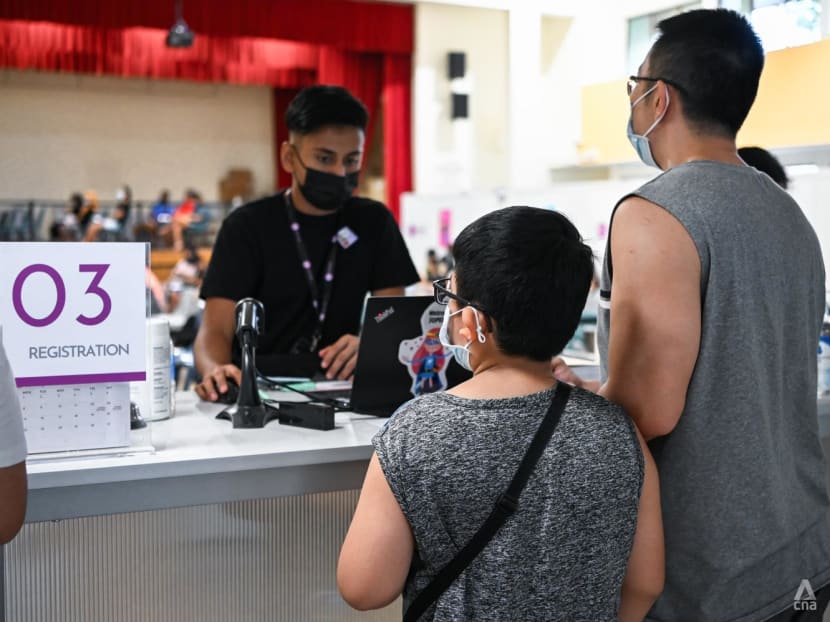No plans to include COVID-19 vaccinations in National Childhood Immunisation Schedule: Ong Ye Kung
COVID-19 vaccinations for children aged six months to five years old will be rolled out end-October or early November.

A parent registering his child for his vaccination shot on 27th Dec, 2021. (Photo: CNA/Hanidah Amin)
SINGAPORE: The Government has no plans to include COVID-19 vaccinations in the National Childhood Immunisation Schedule, which lists the recommended types of vaccines from birth until 17 years old, said Health Minister Ong Ye Kung on Tuesday (Sep 13).
The immunisation schedule covers vaccinations against several diseases such as tuberculosis, hepatitis B and diphtheria, which are of “significant healthcare burden” to Singapore if the population was not vaccinated, according to the Health Ministry.
Of the 12 listed in the schedule, vaccinations against measles and diphtheria are compulsory for children under the Infectious Diseases Act.
Speaking in Parliament, Mr Ong said there are no plans to include COVID-19 vaccinations in the National Childhood Immunisation Schedule as the pandemic situation is dynamic, and recommendations continue to evolve with new data.
"The Ministry of Health will review this when appropriate," he added.
Mr Ong was responding to a question from Member of Parliament (MP) Yip Hon Weng (PAP-Yio Chu Kang) who also asked for figures to compare the incidence of Multisystem Inflammatory Syndrome in Children (MIS-C) in vaccinated and non-vaccinated children.
The symptoms of MIS-C are similar to Kawasaki disease, which has been linked to various virus or bacterial infections and occurs in 150 to 200 children a year in Singapore.
Symptoms include persistent fever above 38.5 degrees Celsius for three days or more, difficulty breathing, headache, neck swelling, rash, swollen hands and feet, conjunctivitis, diarrhoea or abdominal pain.
As of Aug 29, the incidence of MIS-C was 5.7 per 100,000 for those fully vaccinated amongst COVID-19 patients under the age of 18, according to Mr Ong.
In comparison, the incidence of MIS-C in those who are not fully vaccinated was 38 per 100,000.
When asked when the Health Ministry will be ready to begin COVID-19 vaccinations for children below the age of five, Mr Ong said Singapore has the vaccine supplies, adding that the Health Sciences Authority (HSA) has approved the two-dose Moderna COVID-19 vaccine for those aged six months to five years old.
However, as cases are “relatively low” and children in primary school are currently preparing for their examinations, Mr Ong said the rollout of vaccines for younger children as well as booster shots for those aged five and above would be timed around end-October or early November when examinations are over.
“With peace of mind, parents can bring their children both from six months up to 11 years old either for their primary series or for their booster,” he said.
Mr Ong also said the ministry is bringing Pfizer-BioNTech and Moderna's new bivalent vaccines into Singapore, under agreements with the pharmaceutical companies.
The bivalent vaccines target both the ancestral strain of COVID-19 and the Omicron variant, which includes the BA.4 and BA.5 strains.
“Our intention is to update our vaccines for the National Vaccination Programme as the formulations improve,” said Mr Ong, adding that more details will be shared when the arrangements are confirmed.
However, he urged the public not to delay their COVID-19 shots in order to wait for new vaccines.
“Existing vaccines remain highly protective against severe disease, including for the Omicron BA.5 infections,” he said.
“So if you are eligible to receive another vaccine dose, please receive your vaccination without delay, and not wait for variant-specific vaccines, as COVID-19 is still spreading in the community.”
VACCINATION DIFFERENTIATED MEASURES
Responding to a question from MP Jamus Lim (WP-Sengkang) about whether healthcare resources remain a binding constraint on vaccination differentiated measures, Mr Ong said that while such measures are compulsory for specific settings such as events with more than 500 participants at any one time, business owners and employers also have the flexibility to implement conditions of service that are relevant to their settings.
This includes requiring people to wear masks as well as adopting vaccination-related instructions for customers or workers.
However, he added that the Government is reviewing vaccination requirements as well as vaccination differentiated measures as Singapore lives with COVID-19 as an endemic disease.
This means moving away from counting the number of doses and boosters, and instead ensuring that vaccination is "up to date", he said, adding that the review is expected to be completed in the next few months.
BOOKMARK THIS: Our comprehensive coverage of the COVID-19 pandemic and its developments
Download our app or subscribe to our Telegram channel for the latest updates on the coronavirus pandemic: https://cna.asia/telegram







